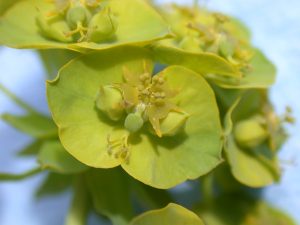Oberea erythrocephala
- Common Name: Red-headed leafy spurge stem borer
- Insect: Beetle, (Coleoptera: Cerambycidae)
- Generations Per Year: One (often 1 in two years)
- Overwintering Stage: Larvae (inside stem)
BIOLOGY: Adults are long and slender (10-12 mm) with long black antennae, red heads, and grey bodies. They are active fliers. Adults lay eggs in June and July. Females girdle the stems and deposit one egg per shoot. Females can produce 60 eggs in their lifetime. Eggs hatch in 7-10 days. Larvae mine the stem and overwinter in the root crown. Larvae are obviously segmented and up to 20 mm long. Pupation occurs in the root crown in May with adult emergence in June.
DESTRUCTIVE STAGE: Larvae (stem boring)
IMPACT TO HOST: Adults girdle stems, causing minor damage. Larvae can kill an entire plant by root mining. When used with Apthona spp. The red-headed stem borer shows excellent control.
REDISTRIBUTION: Adults can be collected in sweep nets from along with Apthona spp. in June and July. A collection of only 50 beetles will be effective in a leafy spurge patch.


